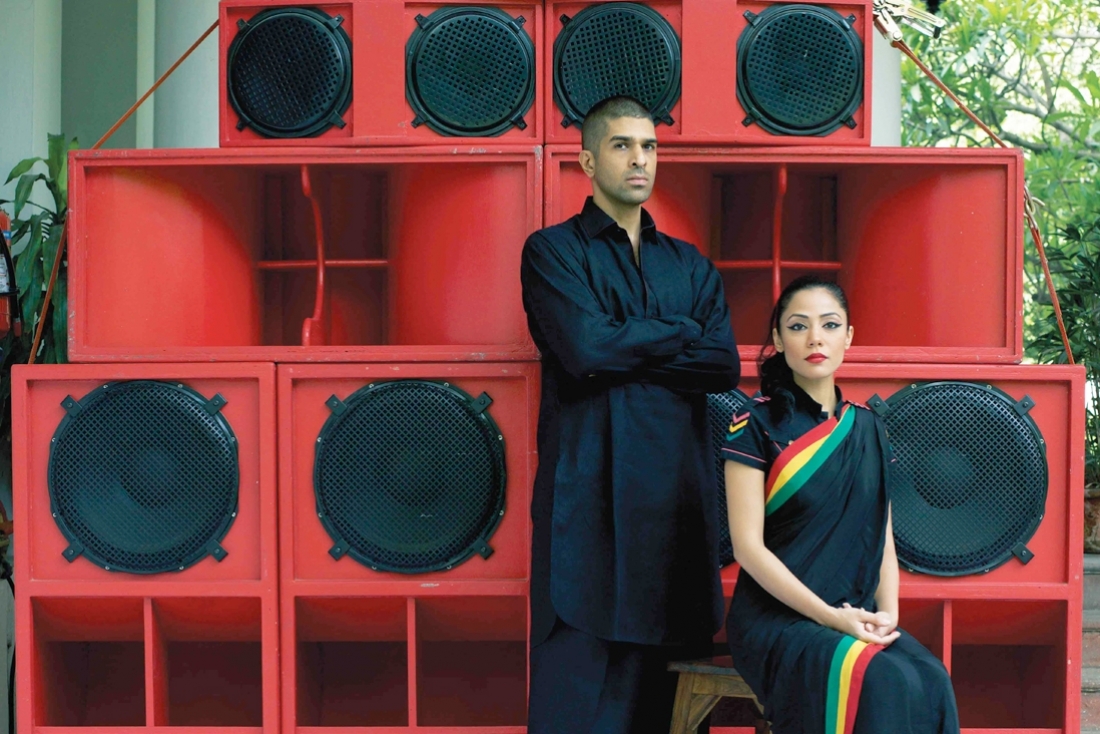

The words they recite have meaning far and beyond. The power of their music gives hope. The echo they resonate leaves you thinking. The message they convey makes you act...ahead of their act at the Boxout Weekender Festival, we revisit our interview with the boss band.
Can you tell me a little about yourself, Delhi Sultanate, BASS Foundation and SkaVengers?
My style is influenced by Afro Carribean music and rap. My artist name is Delhi Sultanate, I am the lead singer of The SkaVengers and owner, selector and MC of Bass Foundation Roots sound system along with my partner Begum X. The Ska Vengers is a live band consisting of around 7-8 members.
Bass Foundation Roots is one of only three custom-built reggae sound systems in India. Jamaican style sound systems are very powerful. Owning our own system allows us to play with the required intensity and sonic integrity. It also allows us to do shows independent of music venues and sponsors. I intend to take the sound out of clubs and conventional music venues and my mission is to tour different parts of the country and support people’s movements.
Of course, t’s lame to reduce music to political or social messages and I don’t regard myself as an activist musician. That being said, we are in the midst of a quasi-colonial situation and the country is undergoing a brutal, fascist onslaught. Friends of ours are under surveillance; writers and thinkers have been killed, arrested or intimidated. Our natural resources are being exploited and destroyed at a rate far worse than at the time of the East India Company and the Queen of England. It’s natural that some of this will be reflected in our music. After all, we are inspired by reggae music, which in turn is profoundly inspired by negritude and rastafari.
Where did your interest in music stem from and when and how did you decide on the kind of music you are going to create?
My interest in music developed at an early age, when I was young I lived as an immigrant kid in Europe. This shaped my relationship to music. My older sister introduced me to rap, Public Enemy, Ice T, NWA—quite radical at the time. This was my entry into cultural politics and alternative notions of history. I started rapping at the age of 10 and things grew naturally from there. It was not a conscious decision to get into hip hop or reggae music, in retrospect though I can definitely say that I think it was more relevant to my social experience and understanding of the world than white pop or rock music.
What is it about music that evokes emotion in you?
There is no single element in music that evokes emotion. Music works in its totality and the context of how, where and with whom it is consumed—all these play an important role. In reggae music we speak of word sound and power. There is explicit meaning contained in the lyrics of a song, but in music, sound is as much a carrier of meaning. In reggae music, bass is of a main melodic element and is of primary importance. Bass frequencies have a powerful effect on the human organism. Bass enters the body and we perceive it as warm and comforting. At the same time, it can be dread. If you play reggae music over a powerful sound system, often, a militant subtext emerges that is expressed in the bassline. Like Dr. Das says, in the sound itself you can hear that we have come to break down Babylon. We express our anger against the oppressors and corrupt and destructive Babylonian system. We also express and experience love for each other.
How has your music help you evolve? Have you managed getting lost in your music or finding yourself through it?
Music is my avenue for growth, for equating with life, for communicating and expressing myself. As I grow older, I see myself not trying as hard to make an impression and I am learning to orient myself towards the creation of moments—moments in a performance where a feeling of freedom and creativity can take over. These can’t be forced and it’s only through experience that one can begin to understand the circumstances that are conducive to this.
Through music you express your concerns—is the process of making music and writing cathartic?
It can be, generally I think when one is able to express oneself, whether it’s in a conversation, in prose or in music there is a feeling of satisfaction and a feeling of unburdening. The things that trouble me in the world don’t go away, but you feel less humiliated by them. Whenever I manage to communicate effectively I feel less alone. When I manage to infuse a gathering of people with energy to my music I feel satisfied for a little while.
Lastly where do you wish to take your sound?
I would love to take the sound to Bastar but the area is like a police state and at the moment members of civil society face the wrath of top cop S R. Kaluri and his bloodhounds.
Text Shruti Kapur Malhotra